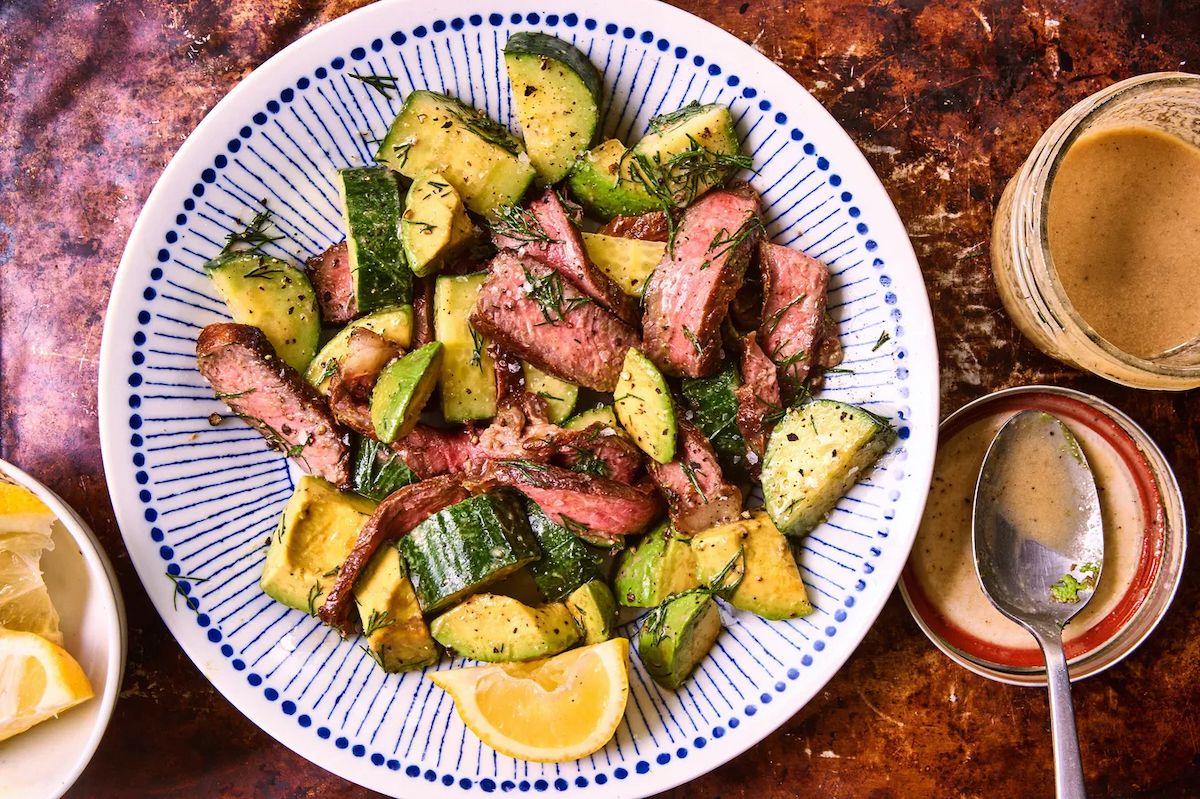Every month, Melina Hammer, Food52's very own Hudson Valley correspondent, is serving up all the bounty that upstate New York has to offer.
* * *
When we moved to our cottage upstate a few years ago, one of the first people we met was our mail carrier, Barton Brooks. Being the outgoing type, we introduced ourselves, and have looked forward to his cheery face peeking out from the mail van ever since. Turns out, not only has Barton run the local mail route for 40 years, but he's at the helm of a picture-book-perfect, 50-plus-acre farm just 10 minutes from our home. There, he and his wife, Rebecca, raise Wagyu cows on rolling pastures. We have sipped drinks together on their wraparound porch, taking in hummingbirds and deer in the uninterrupted sunset, plus any last antics the calves may have to share for the night.
Today, get to know Barton and Rebecca for yourself, and learn all about their serene corner of New York state. (This interview has been edited and condensed for length and clarity.)
MELINA HAMMER: Tell me your farming story.
REBECCA COLLINS BROOKS: Hilltop Farm is the home of our business, Catskill Wagyu. The farm gets its name from the high hill where most of our hay fields sit. From there, we have a panoramic view of the entire eastern Catskill range, and on the other side, the Shawangunk Ridge, known to rock climbers as "the Gunks." We sit in the Rondout Valley near Rondout Creek, a tributary to the Hudson River, so we are also part of the Hudson Valley.
This land has been farmed by Barton's family for three generations before him. Barton purchased it from his grandfather when he was 18. He's the reason behind my belief that farming isn't what someone does, it's who someone is. Everything on this farm, he built with his own two hands — the barns, the house, the pastures. It was important to Barton that both buildings and creatures are able to be here with as little impact on nature as possible.
This is a second marriage for both of us, and the farm is working toward something new together. Barton was a traditional dairy farmer for many years, and when we first started dating, there was little time for actual dates! So we spent time in the barn doing chores, or cooked a meal together afterward, or spent time in the fields during hay season. Some of our best conversations were shouting over the noise of farm machinery.
In 2010, Barton sold his milking herd due to crashing milk prices. It was a heartbreaking decision, because he loved his cows. We continued to purchase replacement heifers for dairy, but that, too, was directly impacted by the price of milk. In the last batch of heifers we purchased, there was one beautiful girl who stepped off the delivery trailer and made us both say, "Wow!" We knew we wanted to milk cows on a smaller scale, and to maybe sell raw milk and farmstead cheese right off the farm, and she was a good reason to make our dream a reality. Her name is Brie, and I practice making cheese with her milk almost daily. This was all part of a plan to diversify, to have some value-added products, and to be able to show people what amazing food can be produced on a small farm.
MH: Why Wagyu beef?
RCB & BB: Wagyu started almost as a running joke between us. I had always wanted to taste it. I'd read that Wagyu has a high nutritional value due to a higher concentration of omega-3 and omega-6 fatty acids in the meat, and that was intriguing to us as people who love growing good food. We talked about finding a Wagyu steak somewhere, but the cost in a restaurant was just too dear, and there wasn't any available in the stores at that time.
We practice artificial insemination on our farm because we want genetic diversity in our herd, and AI gives us great choices from that standpoint. One day, I arrived home from work, and Barton greeted me: "Becky, I have a surprise for you!" Knowing Barton, I knew there was no way it was a diamond bracelet, but I was as excited as could be when it turned out our semen dealer had been to the farm that day, and Barton had purchased three units of Wagyu semen. (Yes, there is such a thing as a semen salesman!)
We bred our cow Lil to a very famous Wagyu bull, and when we tasted the results we were hooked. We've always raised meat for our own consumption, but this was unlike anything we'd ever eaten. The fat was buttery, almost creamy, and the meat was so beefy and rich. We kept all of it for ourselves — it was so delicious we didn't want to share. Based on that one animal, we knew we wanted to make this something we would sell from the farm, direct to the consumer.
We found a well-known Wagyu farm near us, and the owner was unbelievably generous with her time; farmers are for the most part really supportive of one another, and we were able to reap the benefits of that generosity. We spent a day there learning, because Wagyu is not a traditional beef breed. There are important considerations to take into account, mainly that we live in the Northeast, and Wagyu calves aren't cold-hardy. Once we figured out a plan, we knew this was something we wanted to pursue, and it has been full-steam ahead ever since.
MH: How does raising beef fit into a sustainable farming?
RCB & BB: Many people think sustainability is solely an environmental term — and that is a huge part of it. As farmers we use natural resources to grow food for public consumption, and the worst thing we could do is damage the resources on which we rely. We are careful to replenish what we've taken, and to never take so much that we will harm the ecosystem in which we exist.
Economic sustainability is also critically important. Raising beef, especially this highly specialized beef, has given us a value-added product that has helped from this perspective. Farmers are intimately familiar with economics and the commodities markets. Because cows are super-digesters, they can convert otherwise inedible plant material into highly nutritious food (beef) for our community. The list of agricultural byproducts cows convert to food is long: brewers' spent grain, wine pomace, even kelp from fish farming. Beef cows are intimately entwined with all of these other agricultural industries.
Another aspect of the sustainability model is the social part. We feed people, and we want to be able to do that in as ethical and responsible a way as possible. Our animals are raised with a purpose, and while they are in our care (from birth to death), they are raised with love and respect. Some animals are dairy steers, and they provide naturally raised food for those in the community who cannot afford to purchase it in the store. We've sold whole animals to our local food pantry, so nothing on this farm goes to waste, and these animals serve a truly noble purpose. We know we are raising a high-quality product that is accessible to not just those who can pay a premium, but also those who cannot afford it. So, from a sustainability perspective, we feel good about our place in the food system.
MH: And how does your food fit into the Hudson Valley landscape?
RCB & BB: The Hudson Valley is so amazingly beautiful, and as farmers we want that beauty to be more than skin-deep. We know our farm contributes to the overall environmental health of the valley, rather than act as a detriment.
Because we have cold winters, when grass doesn't grow, we bale and store the grass hay our cows need during those months. In the spring, summer, and fall, they are on pasture, but in the winter they are in our barnyard. All the manure they produce during the winter is spread out on the fields, where it composts back into the soil. Our Wagyu do eat a small amount of grain, but we purchase this from a local source, and it doesn't change the nutritional value of the meat. Each spring we watch our fields turn deep, rich green — there are microbes and earthworms and other organisms regenerating the soil, providing us with a continual bounty. Our undisturbed soil sequesters carbon, so this farm is actually diminishing carbon emissions, not producing them.
There are many catchphrases and buzzwords online and on social media — I try not get caught up using them too often — but the one that holds true for us, especially situated in this gorgeous place, is "from the ground up." We believe that the beef we raise starts literally with the ground our animals walk on. If that ground isn't healthy, if the water isn't clean, then the grass won't be nutritious, and the quality of our beef will show it. It's important to us that the quality of the food we produce matches the originating pristine beauty of our landscape.
MH: It's a tremendous amount of work to manage a farm and live other aspects of life. How do you manage to strike a balance?
RCB & BB: Farming is an enormous amount of work, which is why it's not for everyone. Our dairy cows need to be milked twice a day, every day, without a break. Including the beef cows, we have just over 40 cows, which isn't many compared to other farms, but it's like having 40 children.
We spend many evenings taking walks up on our hill to look at the mountains, or sitting on our front porch overlooking the pasture and watching the antics of the calves — they can be hilariously funny. This ecosystem we've nurtured is our best playground, actually. We love heading into the hedgerows to pick blackcaps, from which I make jam or pie. We savor every bite. Sometimes we take day trips outside the Hudson Valley, but mostly those trips are spent looking at other farms, stopping at roadside farm stands, partaking of food produced by other farmers.
I guess this illustrates again that farming isn't what someone does, it's who someone is, because everything we do always seems to come back around to something farming-related. We really love growing food, for ourselves and for our community. So I guess the balance comes from little moments throughout our daily lives rather than weeklong vacations. And really, we don't need to go anywhere when we feel that we live in the most beautiful place on earth.
MH: What else should we know about you?
RCB & BB: We love meeting people and sharing what we do with them. We love showing our farm and letting people see what sustainable farming looks like. We want to share the rich wildlife and in-your-face beauty of the land, so people understand that the reason our food tastes so good is because it was raised with care for the animals and the land they live on. We want people to know that good farming is an enormous act of love: for the land, for the people who consume the food, for the animals who provide it, and for the unique culture of farming. We feel privileged to be able to do what we do.




Shares